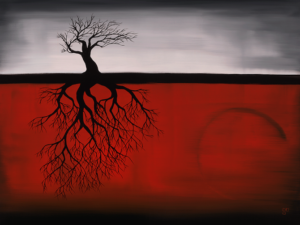Between Bliss and Torment
By Brian
In the Nine Satanic Statements, Anton LaVey outlines the emphasis that Satanism places on carnality. “Satan represents indulgence instead of abstinence,” “Satan represents kindness to those who deserve it instead of love wasted on ingrates,” “Satan represents responsibility to the responsible instead of concern for psychic vampires,” etc. The obvious interpretation is that Satanists revel in pleasures of the flesh instead of imposing upon ourselves harmful dogmas that needlessly suppress our natural desires. However, I think that there is a deeper truth to be found here than the obvious one. It is not just that we enjoy the “sins” other religions shun; it is that we allow ourselves to experience the full range of emotion of which we are capable.
In the chapter “Love and Hate” in The Satanic Bible, LaVey discusses both the absurdity and the hypocrisy of those who promote a “love everyone” mentality. He explains how attempting to love everyone cheapens the emotion, washes it out, so that the people who truly deserve our love do not receive as much as they should because we are too exhausted from the effort required to force ourselves to “love our enemies.” There is a saying, often used in response to the sniveling whine of one who believes that he or she is not receiving nearly enough attention: “Yes, you are an unique and beautiful snowflake, just like everyone else.” In other words, yes, everyone deserves some measure of respect, but some deserve more than others, and there is no shame in admitting this fact. Furthermore, there is no shame in admitting that some deserve our contempt; however, how we channel that contempt is very important. We ought to direct it constructively, lest we waste our time or – even worse – it comes back to harm us. How often do we see the phrase “Don’t feed the trolls” when reading a particularly stupid post and its associated comments in forums and on social media? Sure, you can waste your time hurling insults or refuting the mindless vitriol of an ignorant person, inevitably making little difference as you give them the attention they so desperately want, or you can use that contempt constructively by releasing that anger in the ritual chamber or by writing something thoughtful elsewhere, where it has the opportunity to make a difference.
In “Indulgence… Not Compulsion,” LaVey describes the chief difference between indulging in our desires and being compelled to do something, even if it is enjoyable: choice. It is lack of choice that produces a compulsion, and a compulsion perpetuates the lack of choice when a person is powerless to resist it. Addictions of all kinds, whether they are physical or psychosomatic, are perfect examples of compulsion. When we are free to explore our desires in a safe way so that they need harm no one, we are set free from the artificial chains that inevitably produce compulsions. And it is not just pleasure that some people fear, but also pain. Many people flee from the “negative” emotions like pain and sorrow that produce suffering, never allowing themselves to feel these like they do the “positive” emotions. This is folly. One look at the S&M community will easily dismiss the notion that pain is always bad, and it is widely understood that delaying gratification can enhance pleasure later. Sorrow can also induce a deeper appreciation for the things we have now. Running from these emotions and seeking only to feel pleasure is itself a compulsion we ought to avoid.
The Buddhist will tell you that it is attachment to things that leads to suffering. While true, this axiom ignores the simple fact that suffering can lead to greater pleasure. “I did not know what I had until I lost it,” says the one who has learned a valuable lesson: indulge in what you have! Permitting ourselves both pleasure and suffering, love and hate, allows us to live as we are, free of compulsions and liberated from the chains of absurd dogma. The deeper truth that I think LaVey was hinting at was not just that we could be truly liberated by enjoying all of our desires, but that we can become masters of the desires themselves. While the dogmatist runs from desire, runs from pain, runs from everything in a race to oblivion, the Satanist understands and enjoys these things responsibly, and in so doing becomes the very thing the dogmatist fears: a god.






